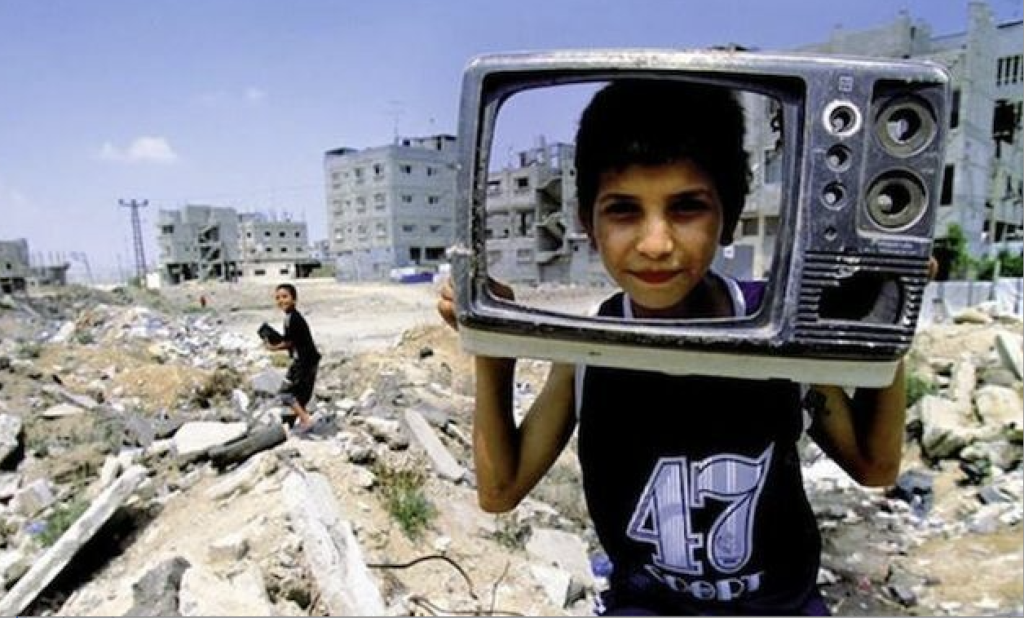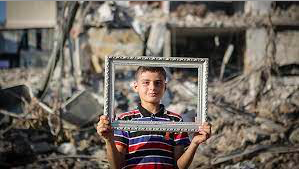Film: Born in Gaza--A Review

By: María Teresa Fidalgo-Azize/ Arab-America Contributing Writer
In Gaza, some of us cannot completely die. Every time a bomb falls, every time a shrapnel hits our graves, every time the rubble piles on our heads, we are awakened by our temporary death.
Mosab Abu Toha, Things You Might Find Hidden In my Ear: Poems from Gaza
After the Hamas attacks on October 7th, 2023, after 75 years of oppression, the Israeli government declared war on Hamas, which has taken the lives of over 25,000 Palestinians.
Whether you believe Israel’s response repays the damage suffered on October 7th, or that to support Palestine is equivalent to supporting the terrorist organization of Hamas, the one thing that transcends ideological, religious, and political division are the images of the children of Gaza. Children whose homes have been somberly described as “graveyards for children” by UN Secretary-General, Antonio Guterres. Currently streaming on Netflix, the documentary Born in Gaza has found a resurgence of viewers seeking to understand the Israel-Palestine conflict, specifically within the 2014 context.
Film Analysis

The 2014 documentary Born in Gaza, directed by Hernán Zin, follows ten Palestinian children (as young as 6) after the 51-day Operation Protective Edge [1]war as they are in hospitals, picking up trash and looking for anything of value to sell, roaming around the lifeless street or contemplating the impossibility of their dream of becoming a fisherman. In each vignette, the child expresses how the war has taken either family members from them, the possibility of a dignified livelihood, and the essence of a childhood. I do not mention the children’s names, made almost indistinguishable by their deep sadness. As viewers, we are in media res in a landscape of insurmountable death.
One could argue that implementing a child’s gaze would make the film more truthful, as children are known for their candidness- untainted by adulthood’s ideological worldview. Despite the merit of this documentary’s attempt to provide a point of view of eradicating childhood from a first-person stance, the brevity of time of the interview recording from the traumatic events unfolding sensationalizes the pain of the most affected for attention, in my opinion. Israel is only mentioned once, yet as adult viewers, we can deduce that this invisible enemy is the culprit for the evisceration of childhood. No child should be encouraged to relive their trauma.
Born in Gaza speaks about Gaza through its aerial images of devastation and the children’s rapport with their lives there. There is no lecturing about right versus wrong. Applauding this as a type of post-war cinema verité would be easy. Yet, the moral conundrum is presented in the question: Is it ethical to showcase a minor describing their suicide ideation? You could respond, is it ethical for them to live in such a wasteland because of years of failed policy? And I would agree. The mere reality of a childhood spent abandoned from education and community amidst a land polluted by extremist violence and poverty is unethical in itself. Thus, why even question the politics of representation?
Conclusion
When turning on the news, images of suffering besiege our screens. And yet, regardless of the initial response of empathy, outrage, and disgust, as viewers, we have become numb to such normalized violence. Horror photography has limitations when translated into the politics of change. If we already experienced the reality of Born in Gaza, how would a contemporary depiction of the war portray its impending death? At 27 years old, I believe the most revolutionary image that could provoke intervention for a ceasefire is not accentuating childhood agony but more landscape shots of the annihilation of life- Gaza as a place outside the living.
Sources:
“2023 Hostilities and Escalating Violence in the OPT: Factual Account of Events.” Diakonia International Humanitarian Law Centre, www.diakonia.se/ihl/news/2023-hostilities-in-gaza-and-israel-factual-account-of-events/. Accessed 29 Jan. 2024.
Blumenthal, Max. The 51-Day War: Ruin and Resistance in Gaza. Bold Type Books, 2015.
Dorl, Anna. “Why Netflix’s Born in Gaza is One of the Most Essential Movies Right Now”. Movieweb, 7 November 2023. https://movieweb.com/why-netflix-born-in-gaza-essential-right-now/
Holland, Jonathan. “‘Born in Gaza’(Nacido en Gaza): Film Review”. The Hollywood Reporter, 17 February 2015. https://www.hollywoodreporter.com/movies/movie-reviews/born-gaza-nacido-en-gaza-773657/
Zin, Hernán, director. Born in Gaza. La Claqueta, 2014.
[1] The official dates are from July 8 to August 26, 2014. The motives for Israel’s military operation were a retaliation for the kidnapping and killing of three Israeli teens by Palestinian militants.
Check out Arab America’s blog here!









